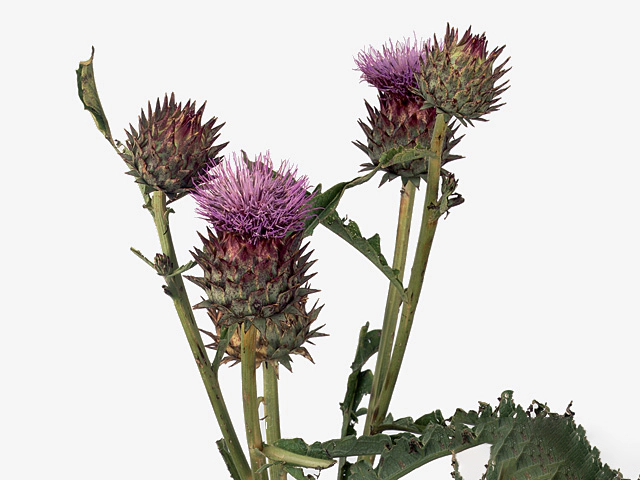Cynara cardunculus

| Flower scent | Unscented |
| Winter hardness | Good (USDA-zone 5, 6) |
| Flower color | Blue-medium violet blue-094B |
| soil pH requirement | Indifferent |
| Light conditions | Sunny |
| Moisture requirements | Well-drained |
Cynara cardunculus, also known as Cardoon, is a fascinating plant that offers a variety of characteristics to consider when incorporating it into your garden. From its unscented flowers to its ability to withstand harsh winter conditions, this perennial plant is a great addition to any landscape.
One notable feature of Cynara cardunculus is its flower scent, or rather, its lack thereof. Unlike many other flowers that emit fragrant aromas, the flowers of this plant are unscented. This can be advantageous for those who prefer a garden without overpowering floral scents or for individuals who may have sensitivities to strong smells. Although lacking in fragrance, the flowers make up for this with their stunning display of blue-medium violet blue colors, specifically classified as 094B on the color spectrum.
Another impressive characteristic of Cynara cardunculus is its winter hardiness. It can thrive in USDA zones 5 and 6, making it suitable for regions with cold climates and frosty winters. This resilience allows the plant to withstand low temperatures and potentially provide year-round interest in your garden. It's a reliable choice for gardeners seeking beautiful plants that can endure the challenges of colder seasons.
When it comes to soil pH requirements, Cynara cardunculus is relatively indifferent. It can grow in a wide range of soil pH levels, accommodating both acidic and alkaline conditions. This adaptability makes it easier to incorporate into different garden settings without worrying about specific soil pH adjustments. Simply ensure that the soil is well-drained to prevent waterlogging, as this plant prefers moisture requirements that balance between being adequately hydrated and avoiding water retention.
In terms of light conditions, Cynara cardunculus flourishes when provided with ample sunlight. It thrives in sunny environments, making it an ideal choice for gardens that receive direct sunlight for a significant portion of the day. When provided with the necessary light, this plant can achieve its full growth potential and produce healthy foliage and flowers.
Lastly, it's important to note that Cynara cardunculus prefers well-drained soil. This plant does not tolerate excessive moisture and can suffer from issues such as root rot if grown in poorly drained conditions. Be sure to incorporate organic matter or amend the soil appropriately to promote better drainage. Additionally, regular watering practices should be implemented to maintain the plant's moisture requirements without causing water accumulation.
In conclusion, Cynara cardunculus offers a range of characteristics that make it an attractive addition to any garden. From its lack of scent to its ability to withstand harsh winter conditions, this plant brings a unique touch to your landscape. Its blue-medium violet blue flowers add vibrant colors to your garden, while its adaptability to various soil pH levels and requirements for well-drained soil allow for flexible planting options. As long as it is provided with adequate sunlight and moisture, Cynara cardunculus is sure to thrive and contribute to the beauty of your outdoor space.
Market availability index by month:
| Jan. | Feb. | Mar. | Apr. | May | Jun. | Jul. | Aug. | Sep. | Oct. | Nov. | Dec. |
|---|---|---|---|---|---|---|---|---|---|---|---|
| 1 | - | - | - | - | 1 | 3 | 4 | 2 | 1 | - | - |